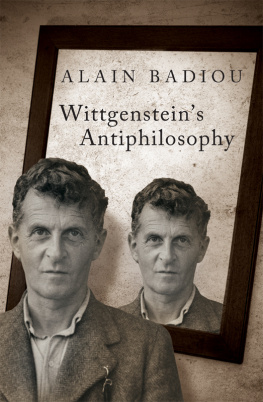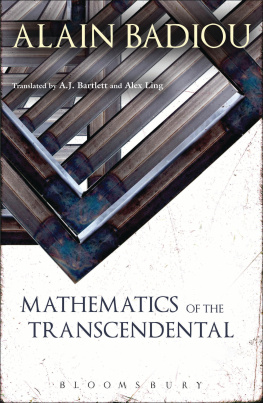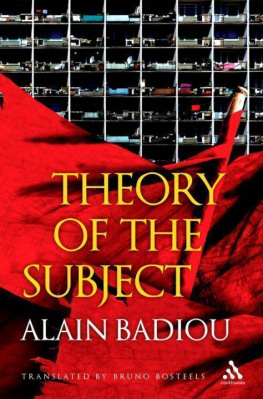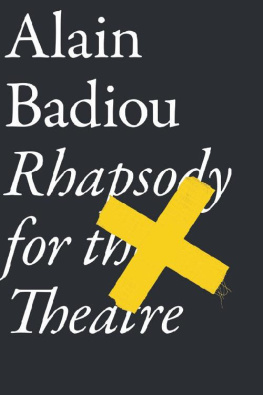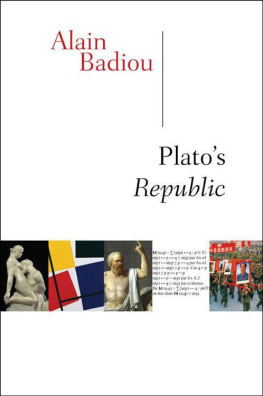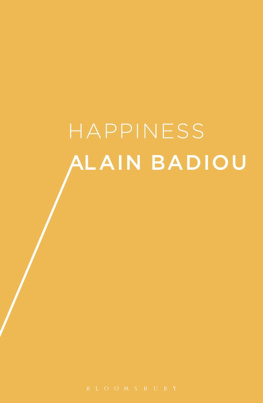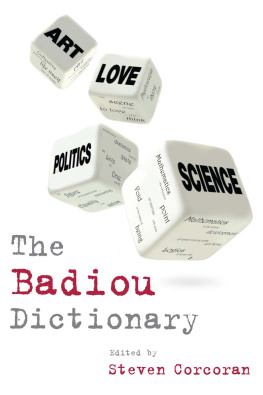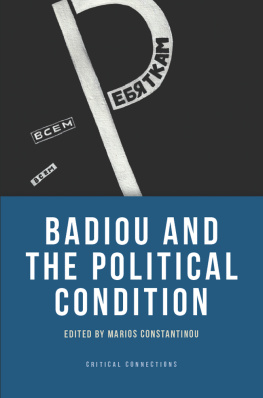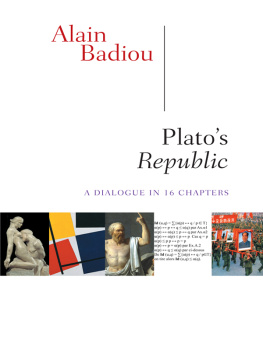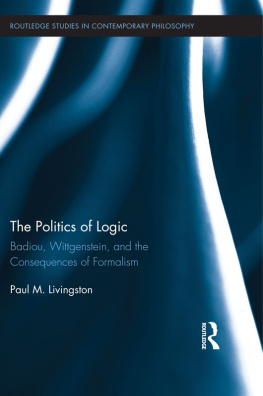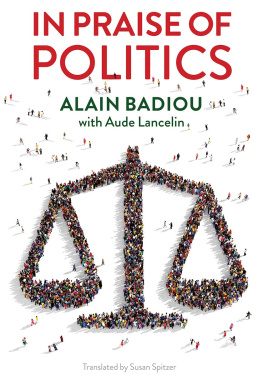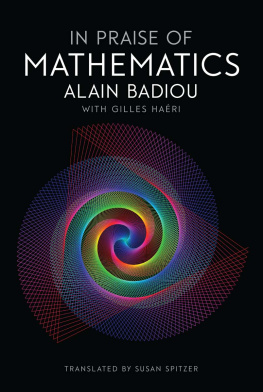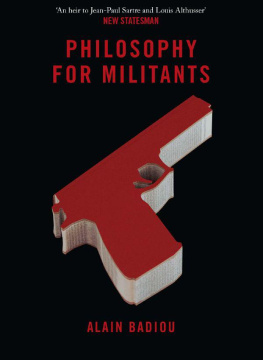Contents

WITTGENSTEINS ANTIPHILOSOPHY
ALAIN BADIOU
WITTGENSTEINS
ANTIPHILOSOPHY
Translated and with an Introduction
by Bruno Bosteels


This book is supported by the French Ministry of Foreign
Affairs as part of the Burgess Programme run by the Cultural
Department of the French Embassy in London
frenchbooknews.com
This paperback edition first published by Verso 2019
First published in English by Verso 2011
Translation and Introduction Bruno Bosteels 2011, 2019
Published first in French as Lantiphilosophie de Wittgenstein
Editions Nous, Caen, 2009
All rights reserved
The moral rights of the authors have been asserted
1 3 5 7 9 10 8 6 4 2
Verso
UK: 6 Meard Street, London W1F 0EG
US: 20 Jay Street, Suite 1010, Brooklyn, NY 11201
versobooks.com
Verso is the imprint of New Left Books
ISBN-13: 978-1-84467-224-0
ISBN-13: 978-1-78873-463-9 (UK EBK)
ISBN-13: 978-1-78873-464-6 (US EBK)
British Library Cataloguing in Publication Data
A catalogue record for this book is available from the British Library
Library of Congress Cataloging-in-Publication Data
A catalog record for this book is available from the Library of Congress
Typeset in Perpetua by Hewer Text UK Ltd, Edinburgh
Printed and bound by CPI Group (UK) Ltd, Croydon, CR0 4YY
CONTENTS
I
In an earlier version of the first of the two essays that make up this short book, Alain Badiou sets the scene and tone of his analysis of Ludwig Wittgensteins antiphilosophy by borrowing a brief anecdote from Jacques-Alain Miller, the son-in-law and official editor of another great modern antiphilosopher, Jacques Lacan:
Jacques-Alain Miller readily tells the story of the little psychoanalyst who, after being spat on every day in the elevator by some nobody, wipes off his jacket and sanctimoniously replies to a bystander who is surprised by his phlegm: What do you expect? Thats his symptom. Miller thus seeks to point out the ominous abjection that lies in wait for psychoanalysis when it is no longer anything else than a pious hermeneutic.
Thus, just as psychoanalysis risks being reduced to a bland acknowledgement of the universal reign of the symptom in which each individual can be seen as passionately attached to his or her own trauma, so too philosophyin the name of the genocidal and totalitarian disasters that mark the long twentieth centuryall too often accepts being confined to the melancholic proclamation of its own undesirability or the prophecy of its well-deserved and imminent end. In both cases, though for different reasons and adopting very different attitudesphlegmatic composure in one case and tragic-pathetic posturing in the othersuch readiness to plead guilty to the charges laid at the doorsteps of the psychoanalyst and the philosopher alike signals a remarkable intellectual forfeiture.
Upon closer inspection, however, the implications of Millers anecdote are greatly complicated when the target of the attack is shifted from a psychoanalyst to a confessed philosopher. In the first place, we should consider the fact that the role of the analyst within clinical practice to some extent always involves a conscious act of self-divestiture. Instead of clinging self-indulgently to the authority of the subject who is supposed to know, an authority conferred by the analysand as a result of the transferential process, the analyst must allow him or herself to become a little piece of waste or refuse (dchet), as Lacan was fond of repeating, most notably in his 196768 seminar The Psychoanalytical Act. Technically speaking, the analyst in the end must come to occupy the position of the objet petit a:
The end term of the analysis consists in the fall of the subject supposed to know and its reduction to the advent of this objet a, as cause of the division of the subject, which comes in its place. The one who, at the level of fantasy, with the analysand, plays the part with regard to the subject supposed to know, to wit: the analyst, is the one who at the end of the analysis comes to bear the fact of being nothing more than this leftover, this remnant of the known thing that is called objet a.
Only by thus being robbed of the last guarantee behind all imaginary ideals and symbolic mandates can the subject work through his or her own fantasies and come to terms with the fact that such fantasies are actually screens that hide (not another, truer or fuller reality, but rather) a substantial void.
Unlike what might be the case for a philosopher, for an analyst to allow him or herself to be spat on in this sense does not fundamentally undermine the premises and aims of the psychoanalytical process; it merely gives this process a too physicalalmost comicalinterpretation while ridding it of the sustained clinical practice that is supposed to assure the analysts self-effacing act. Even if we assume that the spitter in the elevator is actually not a nobody but someone who has undergone or is currently undergoing clinical analysis, the problem is really with the analyst who is seen as giving up all too quickly on his desire, to the point where psychoanalysis, which is supposed to be a radical practice and potentially an even more radical theory of the intervening subject, is indeed reduced to the level of a pious hermeneutic.
Today, of course, there is no shortage of thinkersSlavoj iek being one of the most outspoken among themwho would claim that philosophy itself entails a very similar act of radical subjective destitution. The hyperbolic doubt that leads to the assertion of the Cartesian cogito, especially, would be a direct precursor to the subjects self-divestiture found in Lacans psychoanalysis. And, in fact, Badiou himself reminds us, in Being and Event, that Lacans programmatic return to Freud was doubled by a call for a return to Descartes. What localizes the subject is the point at which Freud can only be understood within the heritage of the Cartesian gesture, and at which he subverts, via dislocation, the latters pure coincidence with self, its reflexive transparency, explains Badiou. He continues:
The subject thus finds itself ex-centred from the place of transparency in which it pronounces itself to be: yet one is not obliged to read into this a
Thus, assuming something that may be far from evident despite its being a common presupposition, including in Badious worknamely, that Descartes stands for the quintessential modern philosopher to whom Pascal can then be the corresponding antiphilosopherwe would be justified in extending the scope of our anecdote so as to examine the contemporary destiny of philosophy in its light. However, no sooner do we try to imagine that todays philosophers, too, frequently allow themselves to be spat on than we must also recognize the fact that, among those lining up to do the spitting, psychoanalysts are often to be found at the head of the queue.
After all, it belongs to Lacan to have revived the eighteenth-century term antiphilosophy for the purpose of defining the relation of his view of the Freudian field to what has traditionally been handed down to us as philosophy since at least Plato: I rise up in revolt, so to speak, against philosophy. What is sure is that it
Following in Freuds footsteps, Lacan in fact considers philosophy a form of psychosis. More specifically, The analytical operation, by contrast, also involves a constant questioning of the philosophers love of truth, which as a result is put in its place: not subsumed in the objectivity of a metalanguage but localized in the topology of the desiring subject.

